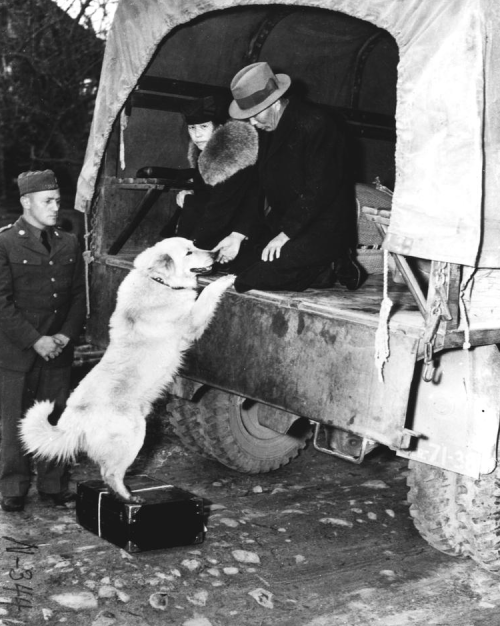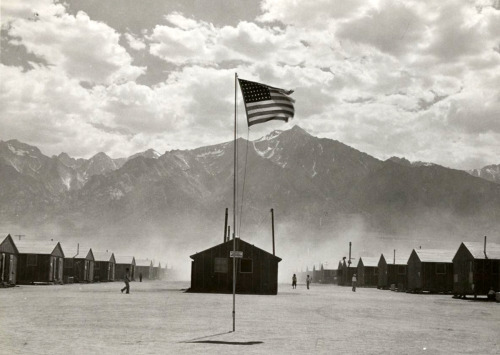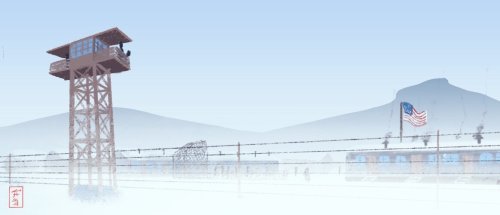#concentration camp

Never Forget.
Never Again.










Just let there be no war!
movie: Dara Of Jasenovac (2021)
song: Just let there be no war, Đorđe Balašević❤️
A Japanese American couple had to leave their dog, King behind during mass removal since pets were not allowed in the concentration camps, 1942
Post link
When he looked back afterwards, all he could recall of the five days that followed was running and looking all the time at the compass to make sure he was travelling in the right direction. Every night he ran, and he ran all night long. Once he slipped into a water-hole and the mud caked on him as it dried. Once he was so torn by branches that blood oozed from the scratches on his face, hands and legs. He would never forget that night. He had come to a close thicket of thorn bushes, and the needle indicated that he should go straight through it. He had hesitated a moment and then tried running a few yards along the edge of it, but the compass needle immediately swung round. Perhaps he could have recovered his direction a little farther on, but he knew so little about the compass that he dared not risk it. And so he plunged into the thicket, elbows up to protect his face. The first branch that struck him hurt painfully, and so did the first gash along his arm, but after that he noticed nothing and just crashed his way through. The nights were usually completely quiet, but that night he could hear a whimpering moan the whole time. Not until afterwards did he realise that the sound had come from himself.
I am David, Anne Holm
(1963)
trans. L.W. Kingsland (1965)
What better way to cap off a series of articles and commentary on the Nazis-as-leftists fallacy than this quote? Good night!
Post link
Dorothea Lange, Manzanar Concentration Camp, 1942 (University of California, Berkeley, Bancroft Library, The Bancroft Library’s War Relocation Authority collection, WRA no. 838).
The Bancroft Library, the superb collection of Americana at Cal, currently is hosting a special exhibit ‘Never again’ about the imprisonment of Americans with Japanese heritage in concentration camps located in some of the most environmentally hostile parts of the West. Wish I had plans to be in the Bay Area before the end of June in order to see the exhibit. The imprisonment is one of the blackest spots in 20th century US history and the Bancroft Collection includes important documentation of the atrocity.
Post link
This was a theme in the popular narratives surrounding the agendas of both Nazi and United States regimes during World War Two. But I’ll get to that in a moment.
In former posts (hereandhere) I described how Freud, succeeded by Bernays, and others such as Goebbels, detailed and utilized the psychology behind such narrative uses of Self and Other to tug at and manipulate the anxieties of an audience.
Gender plays a very powerful role in narratives of Otherness. These are usually read from the male’s perspective, and so the women in such stories, if they are of the Other, they will be just outside the control of the man and so inviting of sexual and political subjugation (as shown in cases ranging from Black women in the war on welfare, to Mexican and Native American women in the wars for the west.)
Applying an understanding of the psychology behind these narratives Goebbels was able to enlist popular support for the final solution, pivotaly, with the film Jud Suss:
“Jud Suss involved the fictionalized account of an ancient criminal trial involving a sinister court official from medieval Wurtemburg. The facts of the matter were altered to become a simple "morality tale” of an innocent, indebted peasant boy (statistical and polling data ensured that the actor represented the most common male type in Germany at the time) in a medieval German town who is locked up by his creditor (money-lender). To save her love, a young voluptuous, blonde German girl (whom all men in the audience will want to sleep with–> as well as be jealous of anybody, that is unlike them, that will try to) pleads with the creditor, who then tries to seduce and ultimately, rape her.“
The American concentration of Japanese citizens in camps during the same time period was reconciled with popular opinion in the same kind of narratives and the same psychological mechanisms–only with an inverted focus. Here Japanese women were consistently presented with excessive themes of both femininity and Americanization, knitting, decorating, taking care of babies and all in hyper-Western fashions.
They were being made sexually accessible, and by that socially acceptable, in their assimilation.
This same process and feminine focus rendered the men an impotent non-party for consideration, but the psychological removal of the threat in this way proved just as consoling–similarly in popular media Japanese men were often displayed as incompetent buffoons.
I’m going to follow this post with a series of pictures illustrating the point.
In honor of this day of remembrance, I thought that I would share a visual development piece for my short film Gaman. On Feb 19, 1942 Franklin D. Roosevelt signed Executive Order 9066, officially starting the internment of Japanese Americans. This was the culmination of decades of Anti-Asian sentiment and racism in the US, and saw over 100,000 Issei, Nissei, and Sansei have their rights and property stripped from them before being forced into concentration camps. Let us have this day to reflect on this horrendous act, and how the same sentiments that created internment manifest today in the US and around the world.
Post link
When I became conscious of myself again, I tried to slow my pace somewhat. But there was no way. These human waves were rolling forward and would have crushed me like an ant.
By now, I moved like a sleepwalker. I sometimes closed my eyes and it was like running while asleep. Now and then, someone kicked me violently from behind and I would wake up. The man in back of me was screaming, “Run faster. If you don’t want to move, let us pass you.” But all I had to do was close my eyes to see a whole world pass before me, to dream of another life.
The road was endless. To allow oneself to be carried by the mob, to be swept away by blind fate. When the SS were tired, they were replaced. But no one replaced us. Chilled to the bone, our throats parched, famished, out of breath, we pressed on.
We were the masters of nature, the masters of the world. We had transcended everything—death, fatigue, our natural needs. We were stronger than cold and hunger, stronger than the guns and the desire to die, doomed and rootless, nothing but numbers, we were the only men on earth.
At last, the morning star appeared in the gray sky. A hesitant light began to hover on the horizon. We were exhausted, we had lost all strength, all illusion.
The Kommandant announced that we had already covered twenty kilometers since we left. Long since, we had exceeded the limits of fatigue. Our legs moved mechanically, in spite of us, without us.
Night - Elie Wiesel
ONE DAY, when we had just returned from the warehouse, I was summoned by the block secretary:
“A-7713?”
“That’s me.”
“After your meal, you’ll go to see the dentist.”
“But … I don’t have a toothache…”
“After your meal. Without fail.”
I went to the infirmary block. Some twenty prisoners were waiting in line at the entrance. It didn’t take long to learn the reason for our summons: our gold teeth were to be extracted.
The dentist, a Jew from Czechoslovakia, had a face not unlike a death mask. When he opened his mouth, one had a ghastly vision of yellow, rotten teeth. Seated in the chair, I asked meekly:
“What are you going to do, sir?”
“I shall remove your gold crown, that’s all,” he said, clearly indifferent.
I thought of pretending to be sick:
“Couldn’t you wait a few days, sir? I don’t feel well, I have a fever…”
He wrinkled his brow, thought for a moment, and took my pulse.
“All right, son. Come back to see me when you feel better. But don’t wait for me to call you!”
I went back to see him a week later. With the same excuse: I still was not feeling better. He did not seem surprised, and I don’t know whether he believed me. Yet he most likely was pleased that I had come back on my own, as I had promised. He granted me a further delay.
A few days after my visit, the dentist’s office was shut down. He had been thrown into prison and was about to be hanged. It appeared that he had been dealing in the prisoners’ gold teeth for his own benefit. I felt no pity for him. In fact, I was pleased with what was happening to him: my gold crown was safe. It could be useful to me one day, to buy something, some bread or even time to live. At that moment in time, all that mattered to me was my daily bowl of soup, my crust of stale bread. The bread, the soup—those were my entire life. I was nothing but a body. Perhaps even less: a famished stomach. The stomach alone was measuring time.
Night - Elie Wiesel





